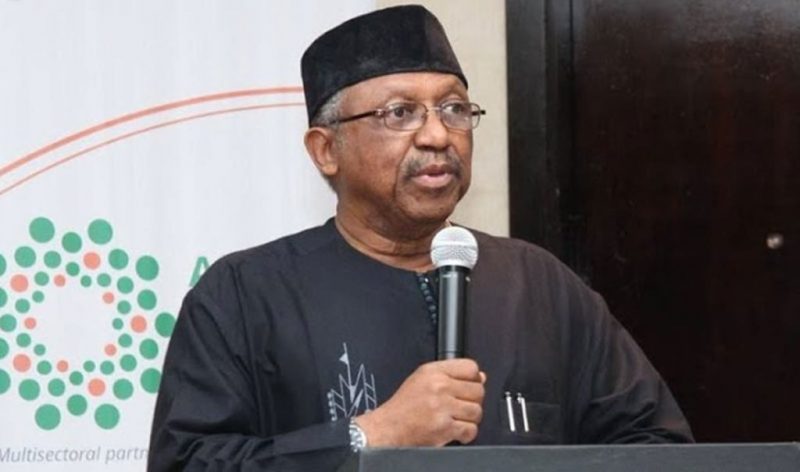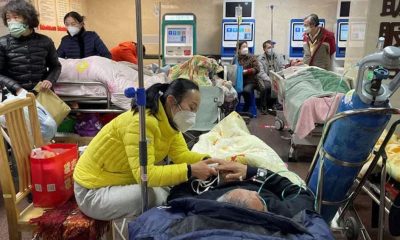Health
Nigerians should expect COVID-19 vaccines by January – Ehanire

Minister of Health, Dr Osagie Ehanire, has said the country expects to receive the first batch of vaccines meant to combat COVID-19 by January.
He said this on Wednesday while addressing State House correspondents after the week’s virtual Federal Executive Council FEC meeting.
Ehanire further disclosed that the country was looking to get the vaccines from more than just one source, adding that the Ministry of Health had already commenced bilateral talks with manufacturing companies and countries that have developed solutions.
He, however, said storage of some types of vaccines and cost of storage were factors being considered in shopping for the products.
The minister said, “We have a technical working group working on the question of the vaccine. We have signed up with the World Health Organisation and GAVI for access to vaccines immediately they are available. But you know that these vaccines are new and the producers are, first of all, not giving any indemnity.
“The big countries where these vaccines are manufactured are of course giving themselves the priority to serve their own citizens first and we hope that the pressure from the World Health Organisation and GAVI (Global Alliance for Vaccines and Immunisation) will be able to get a reserve for other countries which themselves are not manufacturing and be able to attend to what we signed up to; we signed up for the advanced market participation of the COVACS.
“If we are able to get our own, I think it should be by January, but there are two types of vaccines, as you have heard; there are those that haven to be in ultra-deep freezers, the MRNA types of vaccines, freezers that must give you at least -80 degrees. There’s another type that can be in a deep freezer of -20 and there’s another type that can be in a refrigerator of -2 degrees, which is regular refrigerator.”
He also said, “The one that is a regular refrigerator is easy in that you have many of that kind of refrigerators all over our country. -20 will also be easy because we have freezers, but the ultra-cold freezers we hardly have any in our country, therefore to receive and store those ultra-cold vaccines will require that we go purchase those ultra-cold freezers.
“So we are working on the costing and it might be which one we get first. We have to remember again that we have over 200 million citizens and finding a way to get enough to take care of our citizens. That means if we are able to get the vaccine that works well and does not cost us too much or cost of storage and delivery, that’s the one we’ll like.
“We are also having bilateral discussions, talking with manufacturers, some of them have written to us that they want to have talks with us, I think one is already having discussions in the Ministry of Health, the one that British and Russia team are putting together.”
He said the FG was working with them “because if we cannot get enough from one source, we should be able to get from other sources. So, we are looking at multiple sources. We had a conversation with United Arab Emirates. The ambassador came to see us and told us that they are buying vaccines from China and had tested them.
“So, they said they are introducing them to us. So, we said we would listen to them because the one that is effective and healthy in those countries and is available is the one we shall bring and that has also proven to be safe.”
Health
Scientists Warn Popular Hair Extensions Contain Cancer‑Linked Chemicals

Scientists Warn Popular Hair Extensions Contain Cancer‑Linked Chemicals
A new study has revealed that many popular hair extensions, including those made from human hair, contain chemicals linked to cancer, hormone disruption, and reproductive harm, raising serious health concerns for consumers worldwide. The findings, published in the American Chemical Society journal Environment & Health, represent the most comprehensive chemical analysis of this largely unregulated beauty product category to date.
Researchers from the Silent Spring Institute tested 43 hair extension products purchased from online retailers and local beauty supply stores. These included synthetic fibers and bio-based materials, such as human, banana, and silk hair. Using advanced non-targeted chemical analysis and high-resolution mass spectrometry, scientists detected over 900 chemical signatures, identifying 169 distinct chemicals. Most of the samples contained hazardous substances linked to cancer, hormone disruption, developmental harm, and immune system effects.
Among the dangerous compounds detected were phthalates, styrene, pesticides, flame retardants, tetrachloroethane, and organotins. Some chemicals, such as organotins, were found at levels exceeding European Union safety limits, while 17 chemicals identified in 36 products were linked to breast cancer and hormone disruption. Only two products tested were free of hazardous chemicals and labeled “non-toxic”.
READ ALSO:
- Keyamo Defends APC Amid Public Debate, Says Party ‘Not Made Up of Saints’
- Lagos Police Arrest Officers After Fatal Alagbado Shooting Amid Public Outcry
- Armed Bandits Kill 30, Kidnap Villagers in Zamfara Attack
Lead author Dr. Elissia Franklin said the study highlights the disproportionate exposure risk faced by Black women, who use hair extensions at much higher rates than other demographic groups. Surveys show that more than 70 percent of Black women reported wearing extensions at least once in the past year, compared with fewer than 10 percent of women from other racial or ethnic groups. Franklin explained that extensions are often worn for cultural expression, personal style, and convenience, yet users are largely unaware of the health risks posed by prolonged chemical exposure.
Because hair extensions rest directly against the scalp and neck, wearers may experience extended skin contact, and heating during styling can release chemicals into the air, leading to inhalation exposure. The study also found that manufacturers rarely disclose the full list of chemicals used to make extensions flame-resistant, waterproof, or antimicrobial, leaving consumers in the dark about potential hazards.
Consumer advocates are calling for stricter regulation, mandatory ingredient disclosure, and safer product alternatives. With the global hair extension market projected to exceed $14 billion by 2028, experts warn that millions of users could face cumulative exposure to toxic chemicals unless companies and regulators take action.
Dr. Franklin concluded: “These findings make clear that stronger oversight is urgently needed to protect consumers and push companies to invest in making safer products. No one should have to choose between cultural expression, convenience, and their health.”
Scientists Warn Popular Hair Extensions Contain Cancer‑Linked Chemicals
Health
Lassa Fever Deaths in Nigeria Rise to 51 After 15 Killed in Early February – NCDC

Lassa Fever Deaths in Nigeria Rise to 51 After 15 Killed in Early February – NCDC
Nigeria is facing a rising Lassa fever outbreak in 2026, with 15 deaths recorded in the first week of February, pushing the total fatalities from confirmed cases to 51 between the first and sixth epidemiological weeks, the Nigeria Centre for Disease Control and Prevention (NCDC) has reported. This reflects the continued severity of the viral haemorrhagic disease. The 15 deaths reported between February 2 and 8 translate to a Case Fatality Rate (CFR) of 21.3 per cent, higher than the 19.4 per cent recorded during the same period in 2025, despite a decline in overall suspected cases compared to last year.
Two healthcare workers were also infected in week six of the outbreak, highlighting the ongoing risks faced by frontline responders. Cumulative data for 2026 show 1,034 suspected cases, 240 confirmed cases, and four probable cases, spread across 10 states and 42 Local Government Areas (LGAs). For comparison, during the same period in 2025, Nigeria recorded 1,913 suspected cases, 413 confirmed infections, and 80 deaths across 11 states and 63 LGAs, showing a reduction in suspected cases but persistence of high fatality rates.
READ ALSO:
- Mob Kills Injured Motorcycle Rider After AK‑47 Rifles, Ammunition Found in Crash Scene
- Tacha Condemns False Rape Allegations After Mirabel Admits Fabrication
- UK Court Hands Life Sentence to Nigerian Teen for Knife Attack Killing
In the latest reporting week alone, 15 deaths occurred from 74 confirmed infections out of 271 suspected cases, resulting in a weekly CFR of 20.3 per cent. Confirmed cases increased from 44 in epidemiological week 5 to 74 in week 6, indicating a week-on-week rise in infections. The new confirmed cases were reported across eight states — Taraba, Ondo, Bauchi, Edo, Benue, Nasarawa, Kogi, and Ebonyi — affecting 24 LGAs.
Data analysis shows that 89 per cent of confirmed infections in 2026 are concentrated in four high-burden states: Bauchi (38%), Taraba (22%), Ondo (20%), and Edo (9%), while the remaining 11 per cent of cases were reported from six other states. The outbreak predominantly affects people aged 21 to 30 years, although cases range from 1 to 74 years, with a median age of 29 years. The male-to-female ratio among confirmed cases stands at approximately 1:0.7.
To manage the outbreak, the NCDC has activated the National Lassa Fever Multi-Partner, Multi-Sectoral Incident Management System (IMS) to coordinate surveillance, case management, laboratory support, and risk communication across affected states. The agency has urged citizens to adopt preventive measures such as improving sanitation and hygiene, practicing rodent control, ensuring early presentation of suspected cases at health facilities, and cooperating with public health authorities. The NCDC emphasised that timely intervention, early treatment with Ribavirin, and community awareness are critical to reducing fatalities and containing the outbreak.
Lassa Fever Deaths in Nigeria Rise to 51 After 15 Killed in Early February – NCDC
Health
Ramadan Health Tips: Six Ways to Stay Hydrated While Fasting

Ramadan Health Tips: Six Ways to Stay Hydrated While Fasting
Staying hydrated during Ramadan is essential for maintaining energy, focus, and overall well-being while observing long hours of fasting. Health experts warn that poor hydration can lead to fatigue, headaches, dizziness, and reduced concentration. Below are six essential, numbered tips to help you stay properly hydrated throughout the holy month:
1. Drink Enough Water Between Iftar and Suhoor
Ensure you consume 6–8 glasses of water between Iftar and Suhoor. Spread your intake gradually instead of drinking large amounts at once, allowing your body to absorb fluids effectively.
2. Break Your Fast With Water
Start Iftar with water to quickly replace fluids lost during the day and prepare your digestive system for food. Avoid sugary or carbonated drinks at this stage, as they can increase thirst later.
READ ALSO:
- Tinubu Urges Senate to Confirm Yusuf for NAHCON, Marafa for INEC
- Galatasaray Stun Juventus 5–2 in UEFA Champions League
- Vinicius Jr’s Wonder Goal Gives Real Madrid Victory Over Benfica
3. Eat Water-Rich Foods
Include fruits and vegetables with high water content, such as watermelon, oranges, cucumbers, tomatoes, lettuce, and soups. These foods support hydration while providing essential nutrients.
4. Reduce Salty, Spicy, and Fried Foods
Limit foods high in salt, oil, and spices, especially at Suhoor, as they increase thirst and can cause dehydration during fasting hours.
5. Limit Caffeine Intake
Reduce consumption of coffee, tea, and energy drinks, as caffeine has a diuretic effect that causes the body to lose more fluids. If taken, balance it with extra water.
6. Never Skip Suhoor
Suhoor plays a crucial role in hydration and energy. Eat a balanced pre-dawn meal that includes water, fruits, vegetables, whole grains, and protein to help sustain you throughout the day.
Maintaining proper hydration during Ramadan fasting helps support digestion, boosts energy levels, and keeps the body functioning optimally throughout the holy month.
Ramadan Health Tips: Six Ways to Stay Hydrated While Fasting
-

 Business2 days ago
Business2 days agoDangote Opens Refinery Investment to Nigerians With Public Share Sale Plans
-

 Education2 days ago
Education2 days agoUTME: JAMB Clarifies Position on Hijab During Biometric Capture
-

 Politics2 days ago
Politics2 days agoTinubu Hails Wike as APC Dominates 2026 FCT Area Council Elections
-

 Entertainment2 days ago
Entertainment2 days agoRegina Daniels Takes Delivery of ₦150m 2026 GAC Trumpchi M8 SUV
-

 Politics3 days ago
Politics3 days agoADC Defeats APC to Win First Polling Unit in FCT Area Council Election
-

 Politics2 days ago
Politics2 days agoFCT Council polls: APC Wins Four Chairmanship Seats as PDP Takes Gwagwalada
-

 News2 days ago
News2 days agoYoruba Muslim Group Dismisses Viral Ramadan Date Claim, Reaffirms Sultan of Sokoto’s Authority
-

 Politics2 days ago
Politics2 days agoOpposition Weakens as Another Governor Eyes APC Move
















You must be logged in to post a comment Login